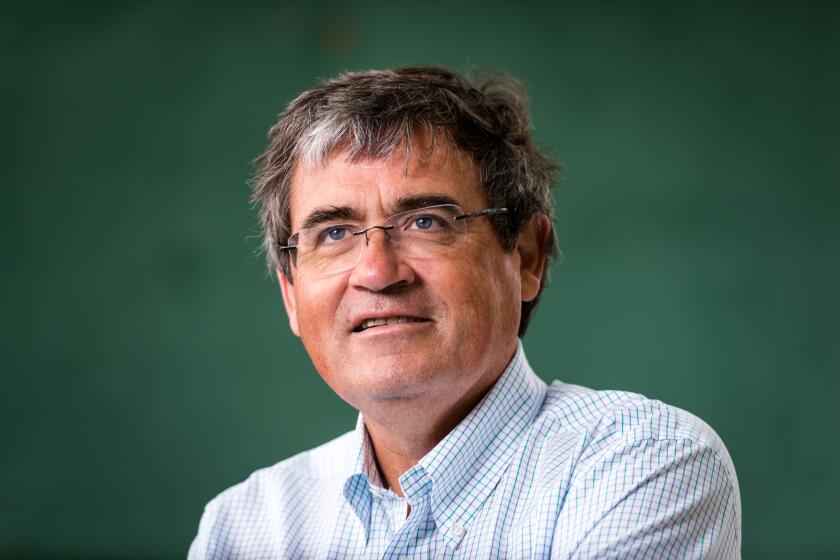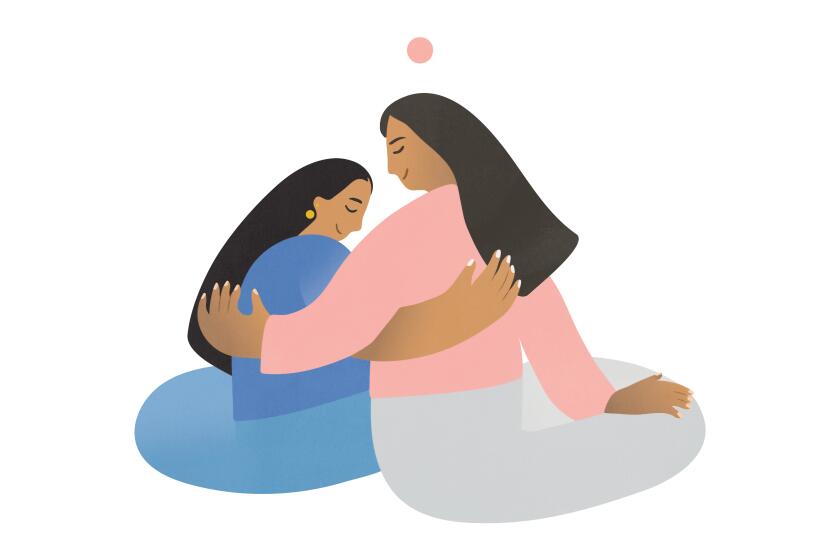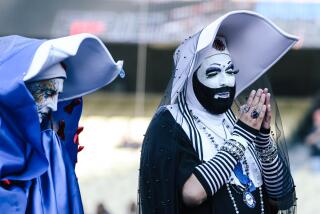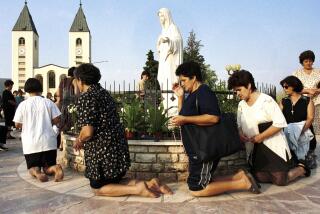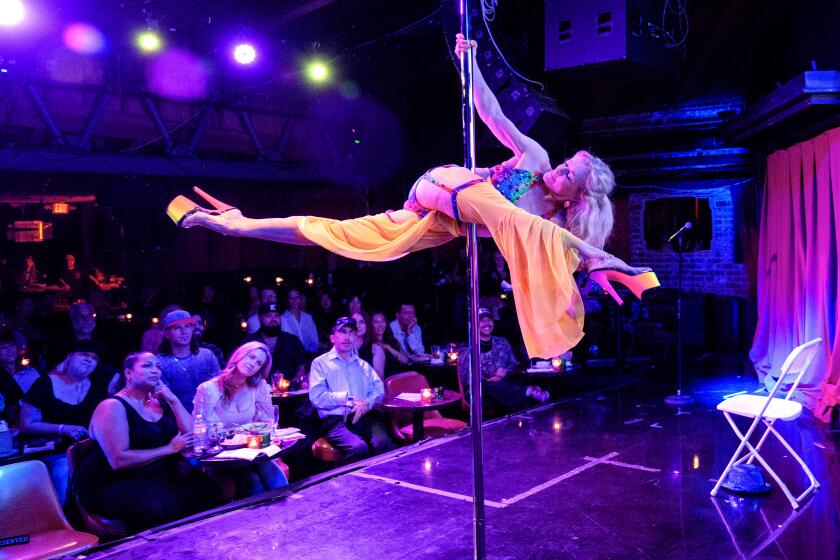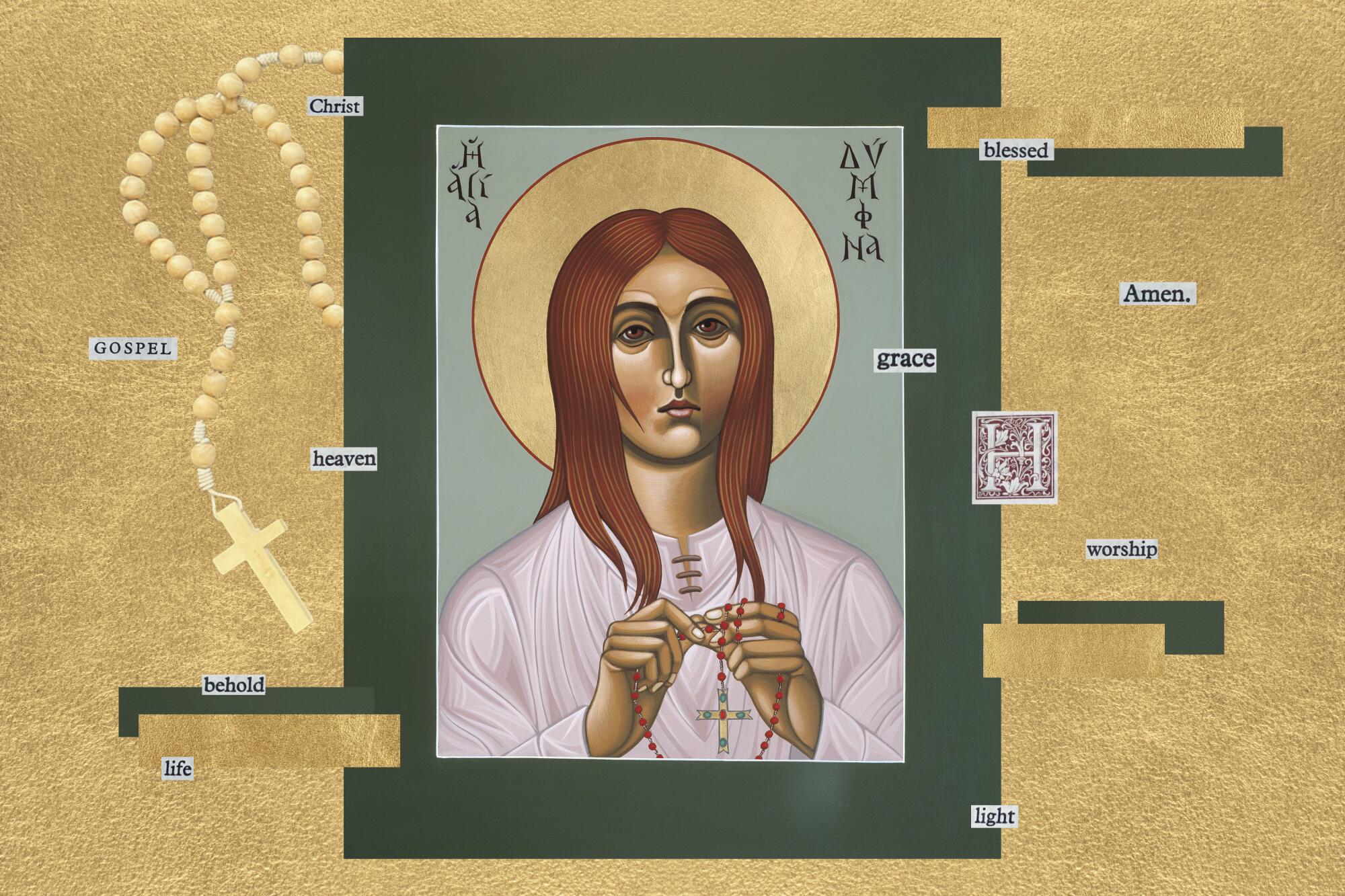
Elena Zuniga didn’t go searching for the patron saint of anxiety, depression and mental illness, but St. Dymphna found her anyway.
First, a small St. Dymphna charm showed up in her jewelry box without explanation. Then a St. Dymphna prayer card fell out of a book she happened to pick up.
And after showing up one morning in 2019 for a meeting about a new mental health ministry at St. Martin de Porres Catholic Church in Yorba Linda, Zuniga soon found herself serving as one of two co-leaders of St. Dymphna’s Disciples — a group that works to reduce stigma around mental illness in the church and supports those in mental distress.
“I didn’t suggest that name and I didn’t plan to lead this group,” said Zuniga, 49, a licensed marriage and family therapist and art therapist. “But it’s like she’s kind of been nudging me along, saying, ‘Hey, there’s a need here.’”

According to Catholic teaching, St. Dymphna was born in Ireland in the 7th century. When her mother died, her father sought to marry his own daughter. He followed Dymphna to Belgium and then killed her when she refused his advances.
When her remains were rediscovered 600 years after her death, it was believed they could heal people who were mad or possessed. A chapel was built in her honor. She’s been known as the patroness of those with nervous disorders ever since.
St. Dymphna’s popularity has waxed and waned over the centuries, but as anxiety and depression rates have skyrocketed in recent years due to the cascading crises of global warming, political upheaval and COVID-19, she’s having something of a renaissance. “Dymphna groups” are springing up in a number of parishes across the country, and as a sign that she’s being accepted by a new generation, “Dymphna” has become an increasingly common confirmation name for young adolescent girls.
“She’s becoming more popular because we need her,” Zuniga said. “Look at the state of mental health throughout the world. We are in a crisis of the soul.”
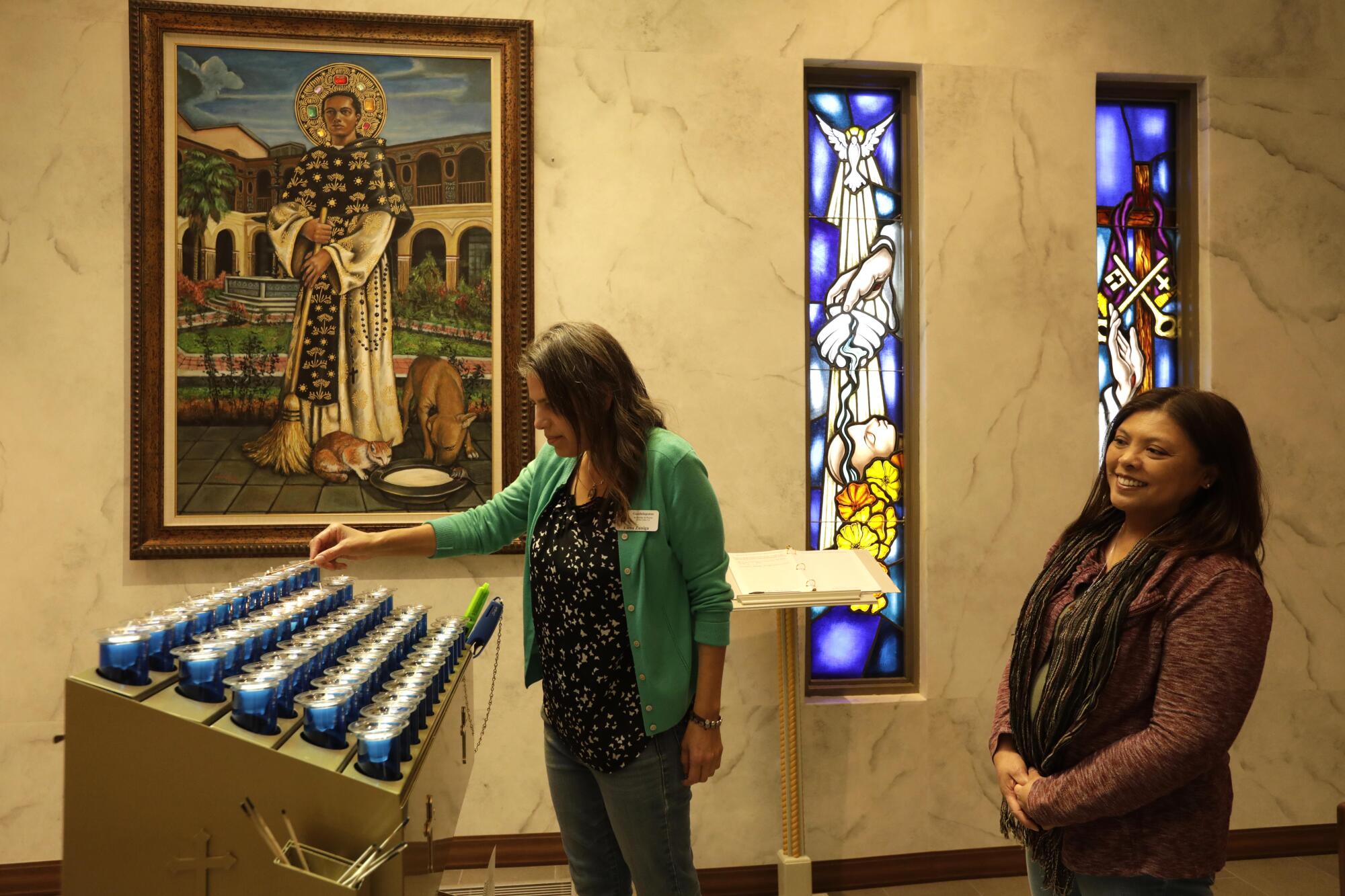
This month, parishes across Southern California offered a novena, or nine days of intentional prayer, to St. Dymphna ahead of her feast day on Sunday as part of a recent push to create a more welcoming environment for those who suffer from mental afflictions.
While the church changed its teachings on suicide in 1992 — encouraging Catholics to pray for people who have taken their own lives and allowing them to be buried in Catholic cemeteries — it still has a way to go to ensure that all parishes have the tools to support those with depression, anxiety and other mental health disorders, experts said.
An expert on the history of mental illness says the psychiatric profession must ‘stop pretending that chemistry is the sole and singular way forward.’
“All too often, people with these illnesses think they are not loved by God and not loved by the community,” said Deacon Ed Shoener, a founder of the Assn. of Catholic Mental Health Ministers. “All of us confront these issues, and if we don’t have a mental illness ourselves, we are close to someone who does.”
When Shoener’s adolescent daughter exhibited symptoms of bipolar disease, the Catholic Church was one of the last places he thought to go for support. “The church did not understand these illnesses well,” he said. “There was stigma and uncertainty and fear about how to react to these illnesses. We can do better than that, and the church is doing better.”

The rate of change has picked up in the last few years. In 2018 the bishops of California published a pastoral letter acknowledging the staggering scope of the mental health crisis in the United States and the role the church can play in addressing it alongside scientists and healthcare specialists.
In 2020 the same group announced a statewide initiative called Caring for the Whole Person to help parishes provide community support and health resources to individuals and families. Last year, the Los Angeles Archdiocese trained more than 100 church leaders on mental health first aid.
“So many folks go to church seeking that spiritual guidance, and 1 out of 5 of them is dealing with a mental health issue,” said Michael Donaldson, senior director of the archdiocese’s office of life, justice and peace. “Our goal is to train parish leaders to better walk with people, accompany them and be a resource to them.”
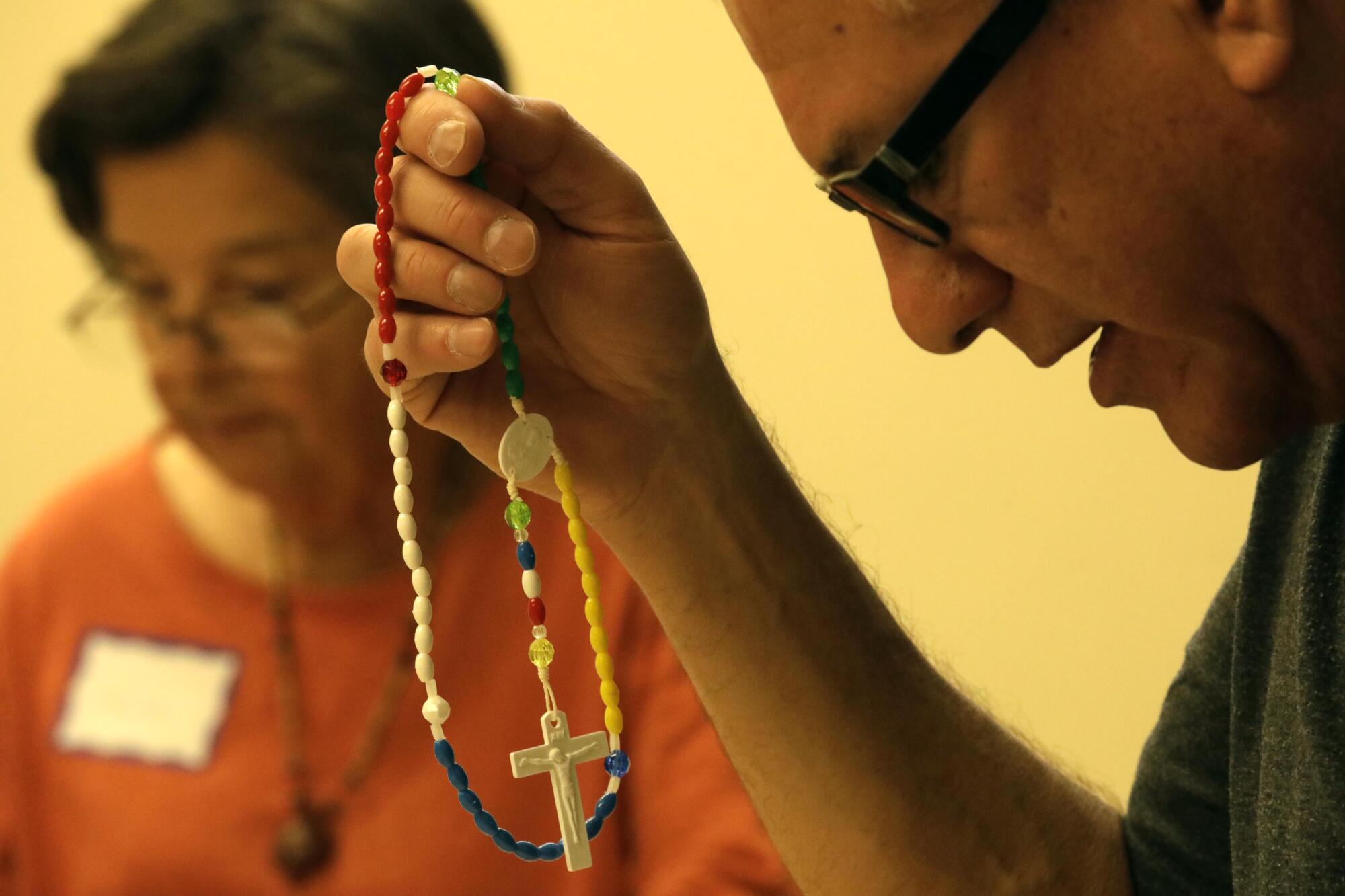
When people come to a St. Dymphna’s Disciples meeting for the first time, Zuniga and her co-chair Cherie Padilla give them a “hope bag” — a small pouch that contains a rosary, holy water and prayer cards for St. Dymphna and St. John of God. Also tucked inside is a card with a list of free mental health resources in Orange County — crisis hotlines, suicide hotlines and the phone number of the Department of Health and Human Services.
Martha Olivares, who attended a recent meeting of St. Dymphna’s Disciples, said she believes in science, and in prayer and miracles too.
Stories and advice about Latino mental health
“In the last few years especially, it’s OK to admit to having a need for counseling for you or your family member,” she said. “This is a way to bring it into the spiritual realm.”
There are several saints who experienced mental health disorders, but St. Dymphna wasn’t one of them.
“It was her father who was mentally ill, not Dymphna,” said William Hart McNichols, a priest and iconographer who painted St. Dymphna in 1996. “In the icon I have her clutching a cross with beads on it, a rosary and she’s looking at you like, ‘Uh oh, help me.’”
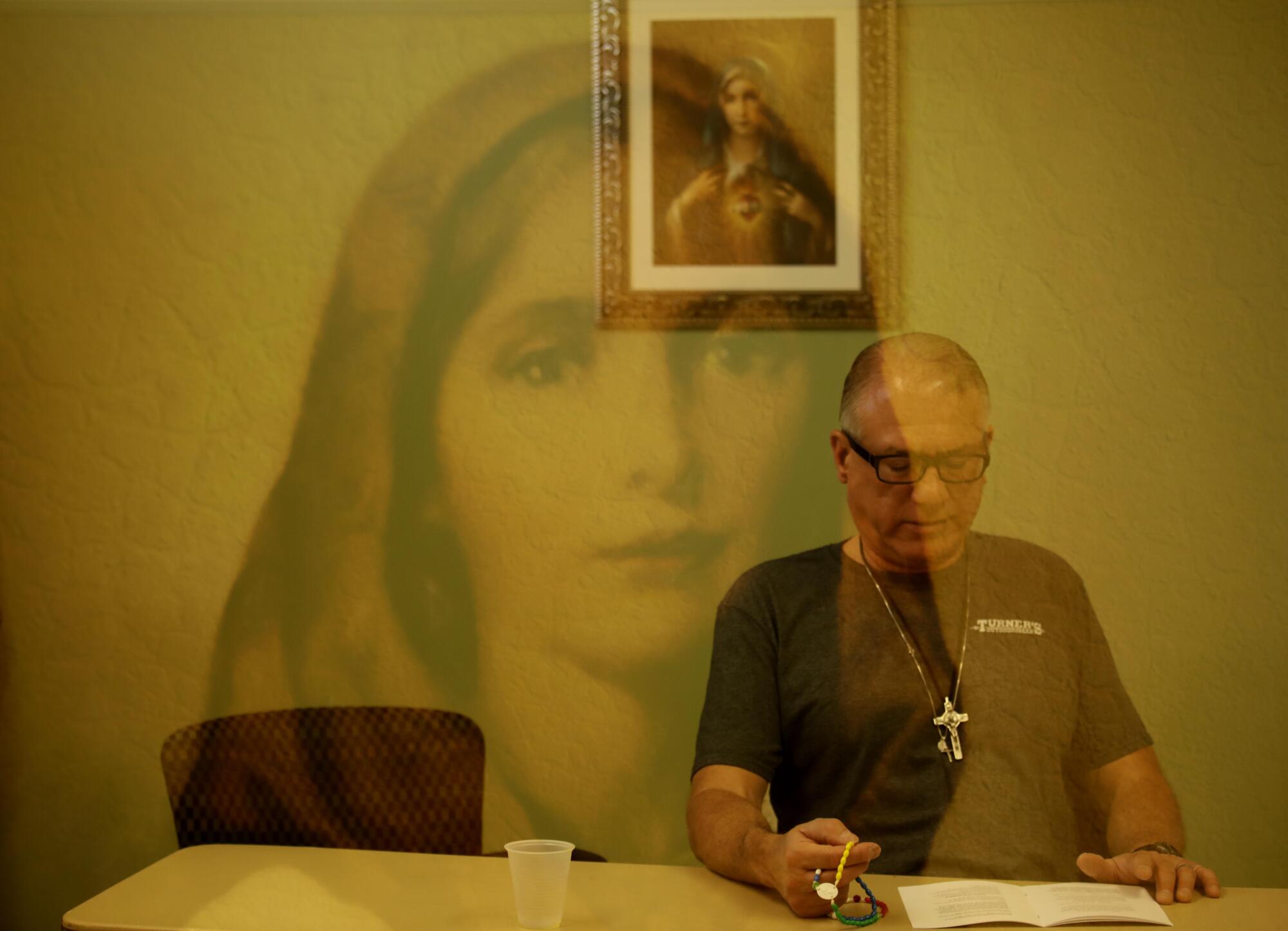
As the legend goes, Dymphna was born to a pagan king and a Christian mother in Ireland. Her mother died when she was 14, and her father was driven mad with grief. He vowed that he would only marry a woman as beautiful as his first wife. When none could be found, he decided to marry his daughter.
When she heard of his plan, Dymphna fled Ireland with a priest, two servants and the king’s fool. The group hid in the town of Geel in what is now Belgium, but Dymphna’s father found them and captured them. He ordered the priest’s head to be separated from his body and tried to persuade Dymphna to return to Ireland to marry him. When she refused, he drew his sword and beheaded her. She was just 15.
Around the time that Dymphna’s remains were found, she developed a reputation for curing people with epilepsy and mental illness, who at the time were believed to be possessed by the devil.
A church honoring St. Dymphna was built in Geel in the 1300s and eventually so many people with mental health issues made pilgrimages to the church that the townspeople began accepting them into their homes, beginning a tradition of home care for the mentally ill that continues in the town today. An infirmary where patients could be admitted if they became completely unmanageable or ill was also set up.
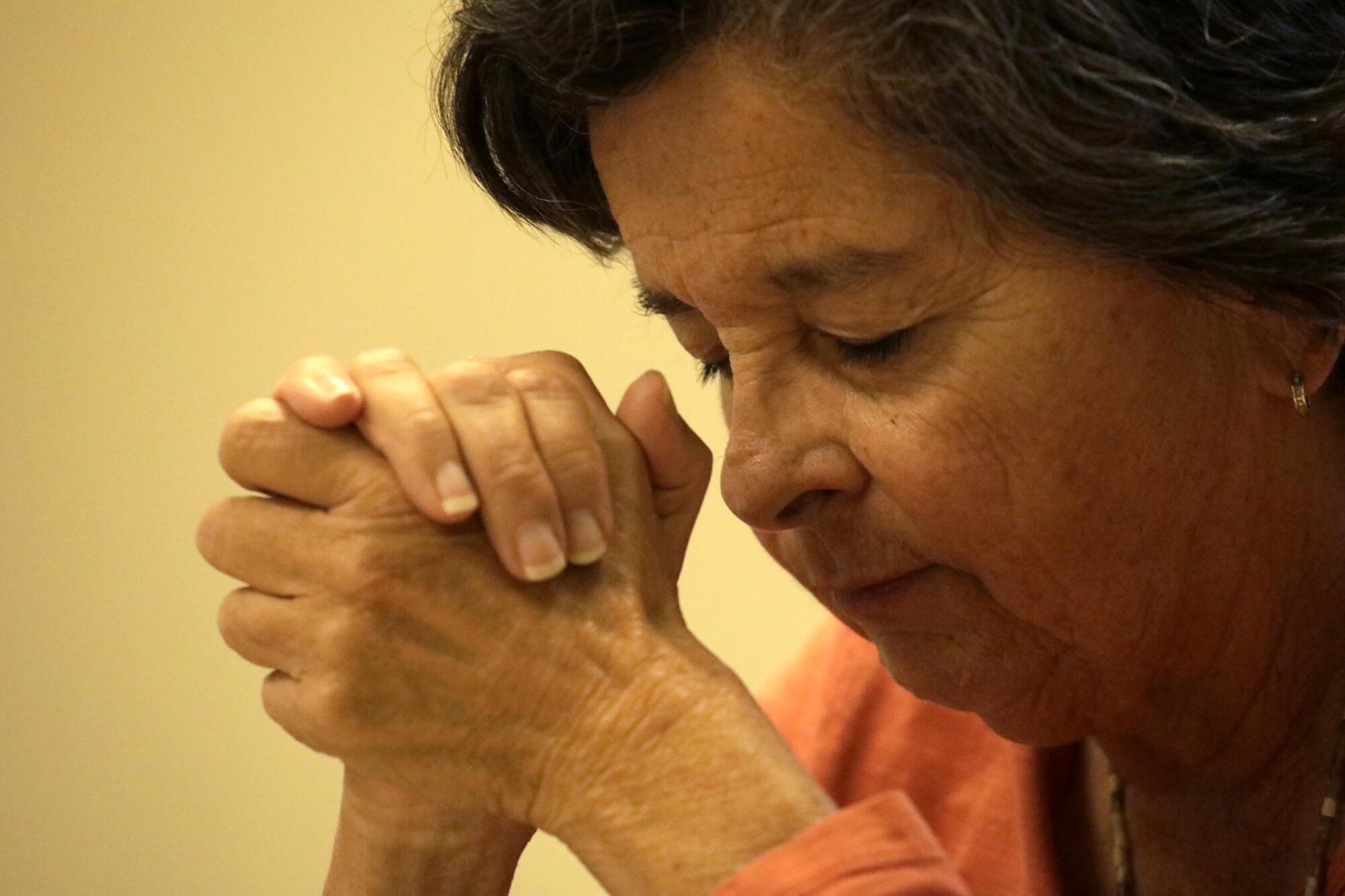
“The real miracle with Dymphna is how the people who live in Geel responded to this special call to welcome people with mental health challenges into their town for centuries,” Shoener said. “It’s an inspiration for how to welcome people and integrate them totally into the community.”
Today, Dymphna is known as the patroness of nervous disorders and mental disease, depression and incest, but she is not the only saint who can help the faithful in times of mental anguish. Those looking for saintly intercession can choose from a pantheon of holy helpers.
Some might turn to the loving mother figure of Our Lady of Guadalupe, who appeared to the Aztec convert St. Juan Diego in Mexico, or St. John of God, who spent time in a mental hospital in Spain before ministering to the poor and sick.
St. Óscar Romero, who risked his life defending human rights in El Salvador and fell victim during its civil war, was reportedly diagnosed with obsessive compulsive disorder, or OCD. Mother Teresa suffered from a great deal of depression and the feeling of being abandoned by God for most of her life.
“People are going to have different devotions depending on where they’re from, and that’s something to be encouraged,” said Cecilia González-Andrieu, a theology professor at Loyola Marymount University.
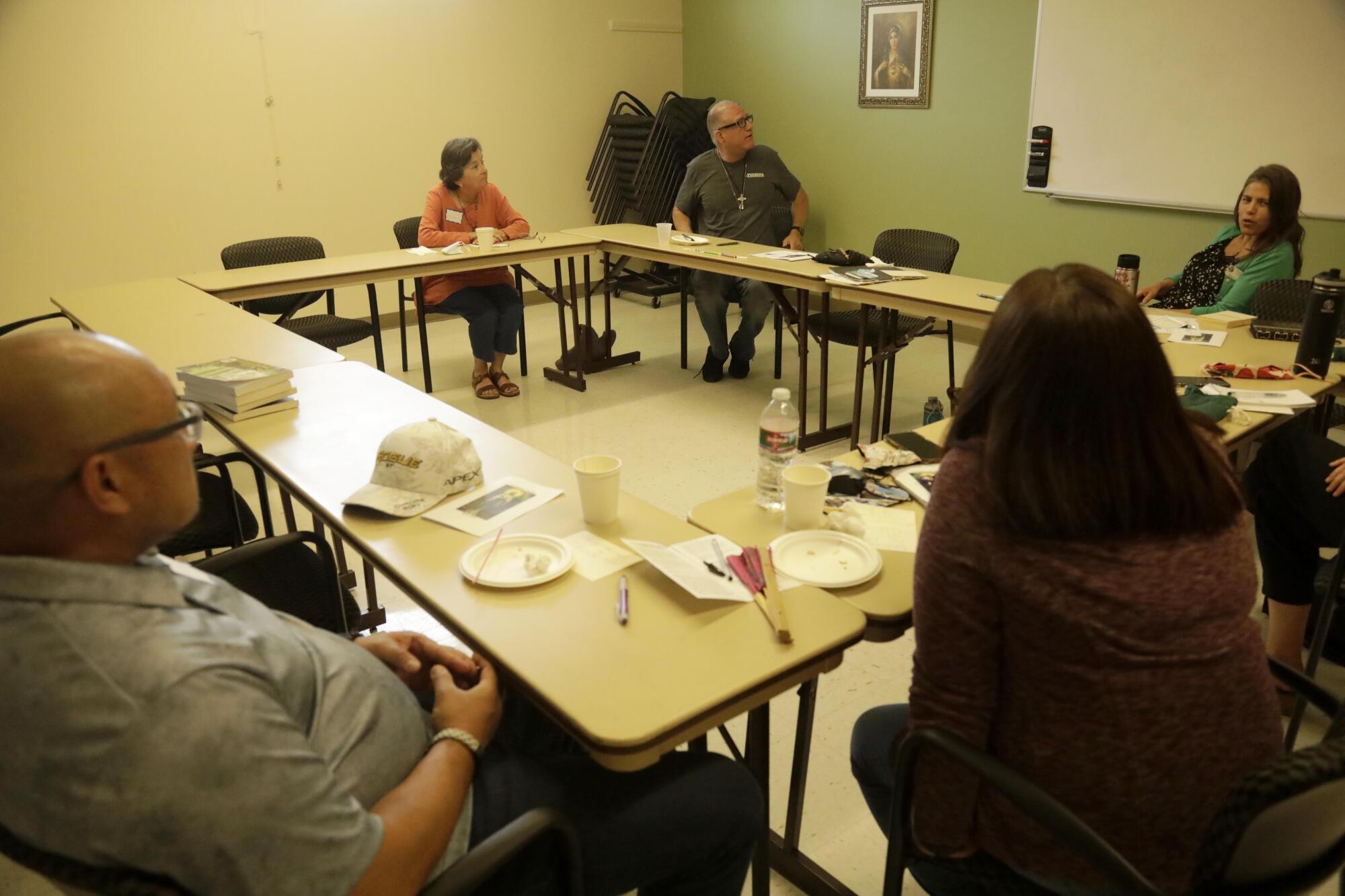
When praying to saints, the expectation is not necessarily that they will perform a miracle but that they will provide a sense of companionship in a difficult time, said Robert Ellsberg, author of the book “All Saints: Daily Reflections on Saints, Prophets and Witnesses for Our Time.”
“They serve as a helper, a guide or a companion,” Ellsberg said. “You could say the saints represent the listening ear of God through the memory of a person that we can visualize and relate to.”
Praying to St. Dymphna could be as simple as reciting the words on one of her prayer cards or sound like a conversation with a trusted friend.
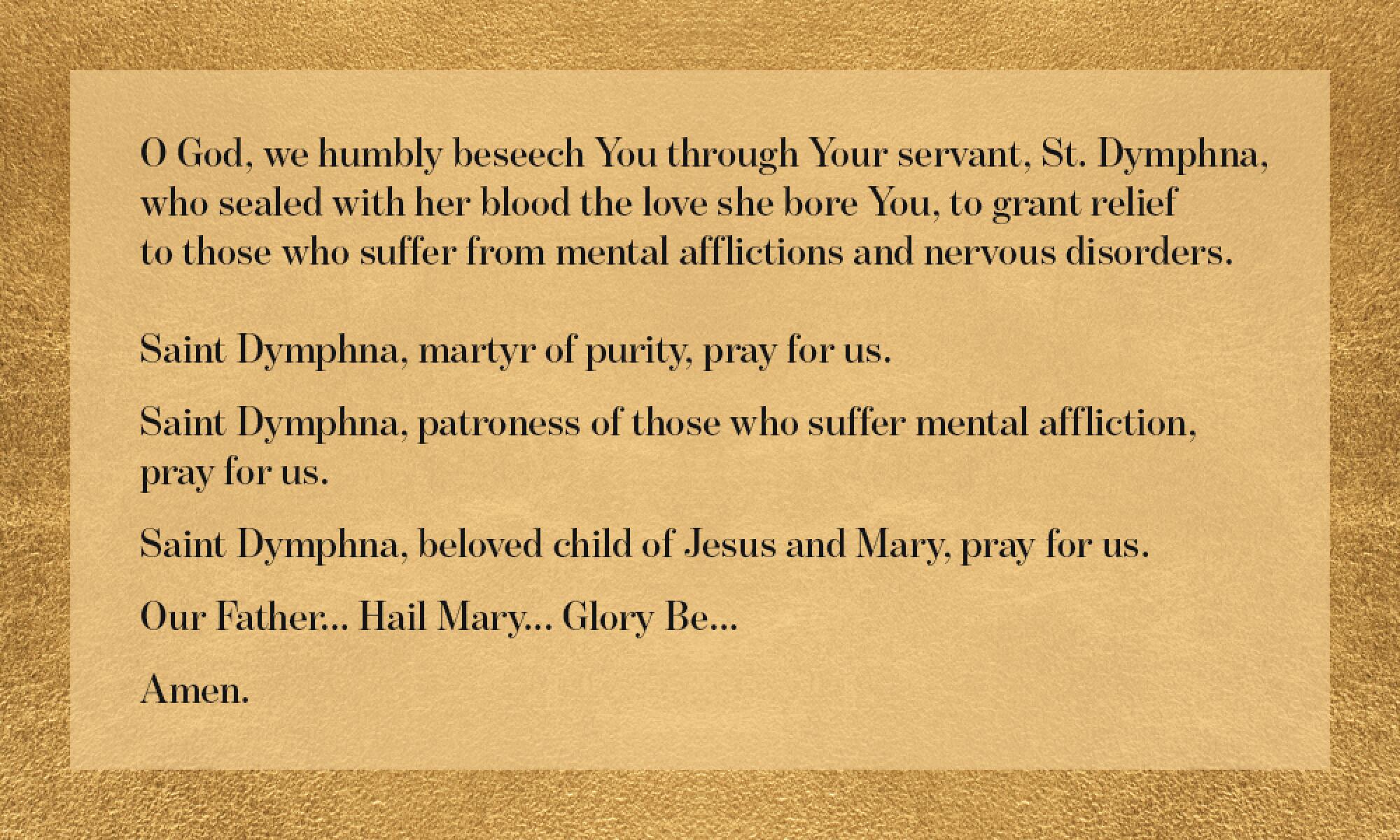
“When it’s a really personal prayer, it’s being really open and having that safe person you can talk to,” Zuniga said. “You can ask for help with whatever your needs are, and if it’s for the higher good, the saints listen.”
Anisha Virgen, director of outreach and social justice at Our Lady of Grace Catholic Church in Encino, spearheaded the novena to St. Dymphna at the church this month. The specifics of the novena differ across parishes; the one at Our Lady of Grace includes prayers for attributes such as faith, hope, charity, piety, justice and fortitude.
“If you or someone you know suffers from mental health, you can trust in the aid of Saint Dymphna,” Virgen wrote in a recent church newsletter.
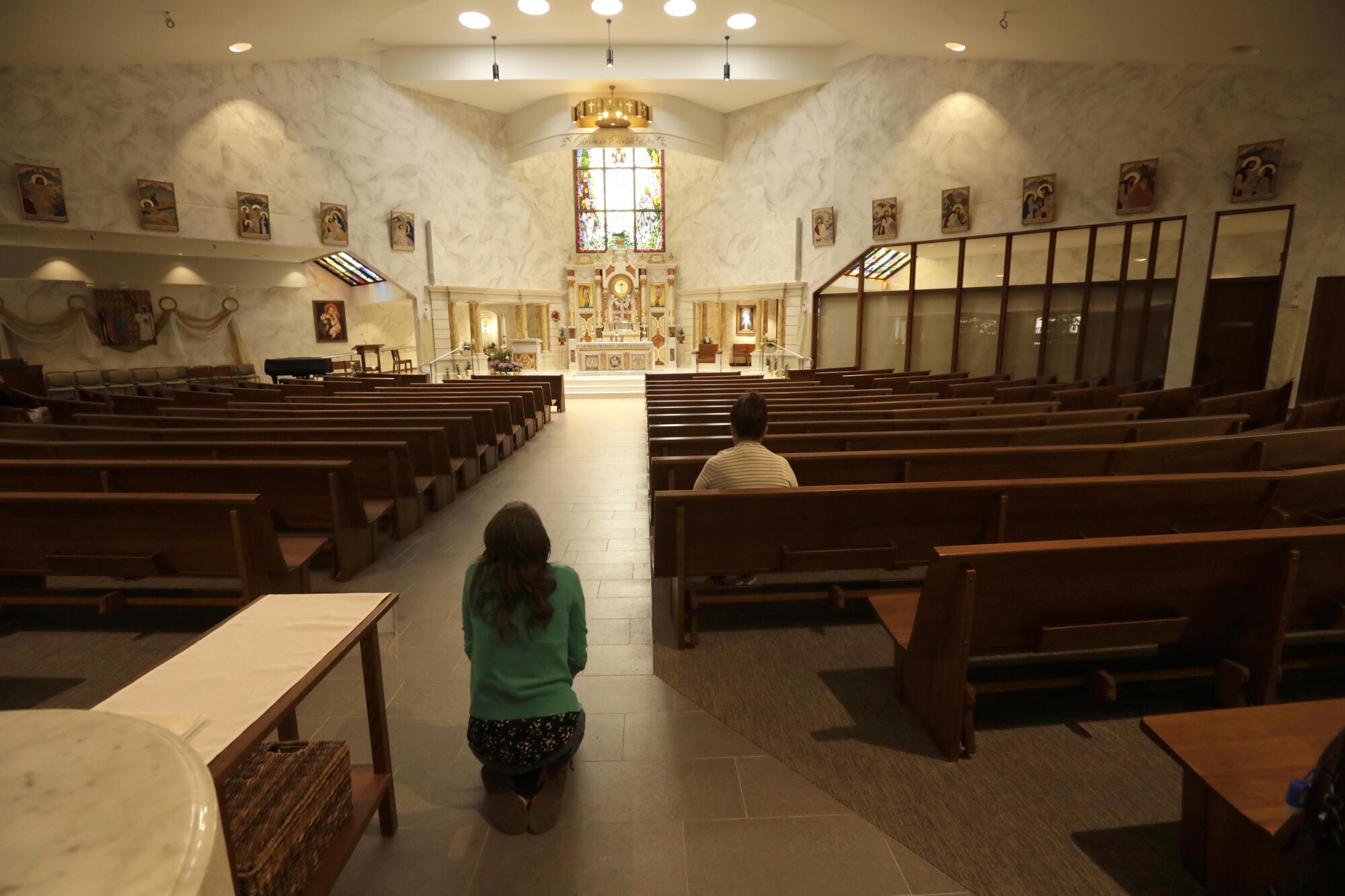
Virgen sent copies of the novena to all the groups in her church — the Knights of Columbus, the Catholic Daughters of the Americas, the antiabortion group, the charismatic prayer group (which had to ask for more copies) and what she calls the rosary group, the women who remain after Mass to pray the rosary every day but Sunday.
“They are definitely novena people,” she said. “They committed for all nine days.”
The St. Dymphna novena is available on the church website for people who want to pray at home, and posters about it have been pinned up around the church.
Virgen believes in the intercession of saints, but she has other reasons for ensuring that everyone in the church has easy access to St. Dymphna’s novena: helping to reduce the shame that many Catholics still experience around mental health issues.
“People are shy, they are ashamed, they don’t want to be seen in a certain way, and they are concerned about judgment,” she said.
The stigma is still real.
St. Dymphna, please pray for us.
More to Read
Sign up for Essential California
The most important California stories and recommendations in your inbox every morning.
You may occasionally receive promotional content from the Los Angeles Times.
